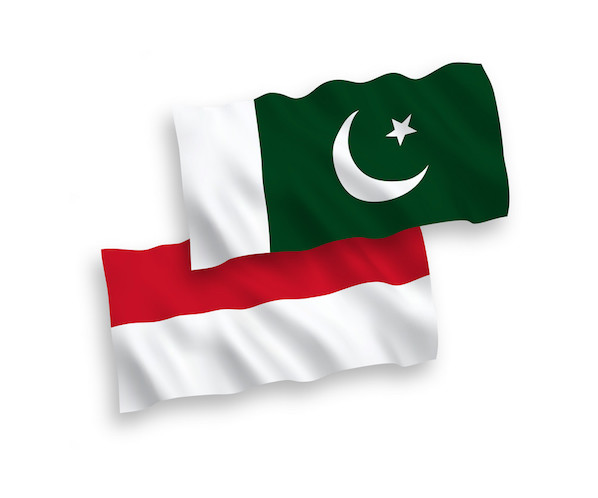A webinar on ‘Historic Perspective of Indonesia-Pakistan Relations and Future Aspirations’ was conducted on October 28, 2021 by the Karachi Council on Foreign Relations. The webinar was moderated by Mr. Farooq Afzal, member Board of Governors KCFR. Ambassador of Indonesia to Pakistan, H.E. Adam M. Tugio addressed the participants as the plenary speaker at the virtual event. The transcript of the webinar is as follows:
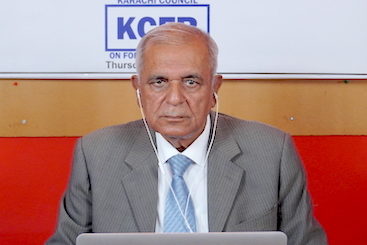
Commodore Sadeed Malik: Bismillah-ir-Rahman-ir-Rahim, Assalam-o-Alaikum, Selamat Pagi, and a very good morning to all of you. I am Commodore Sadeed Malik, Chief Executive Officer and Secretary General of Karachi Council on Foreign Relations. I will share briefly about KCFR; KCFR was founded by late former Chief Justice of Pakistan, Justice Saeed-uz-Zaman Siddiqui. We hold seminars, meetings and deliberate mainly on foreign relations and economic affairs. Ever since COVID-19, we now hold webinars. We have held a number of webinars including with President of Pakistan, President of Azad Jammu and Kashmir, Security Advisor to the Prime Minister of Pakistan, Education Minister, former Finance Minister, ambassadors of a number of countries at Islamabad and foreign dignitaries. Today’s webinar will be moderated by Mr. Farooq Afzal, Member Board of Governors KCFR.

Mr. Farooq Afzal: Thank you very much, Commodore Malik sb. It is indeed a great pleasure and honour for me to moderate today’s webinar on historic perspective of Indonesia-Pakistan relations and the future aspirations. Indonesia has been one of the closest, friendly countries of Pakistan. On behalf of Chairman Mr. Ikram Sehgal and members of the Board of Governors, I would like to welcome H.E. Adam Mulawarman Tugio, the Honorable Ambassador of Indonesia to Pakistan. Now, may I request Ambassador Mian Sanaullah to please present synopsis over Indonesia.
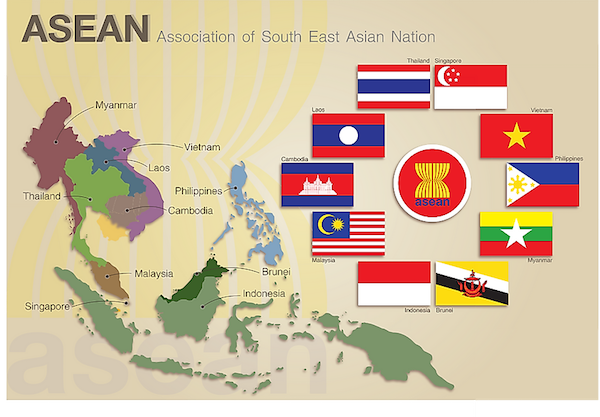
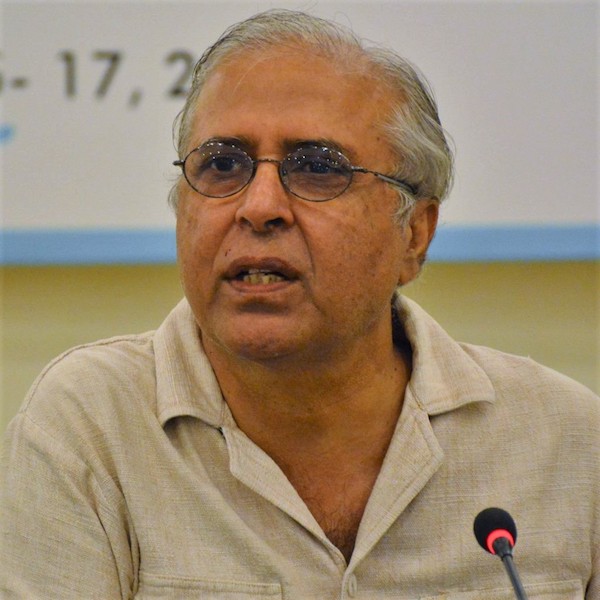
Ambassador Mian Sanaullah: I think Indonesia is a country which is the new face of history in the making in that region. As stated by Farooq sb, our relationship goes prior to the independence of Indonesia. There have been intense correspondence between the founding fathers of the two countries and then there have been Muslims from subcontinent who shed their blood for the independence struggle of our Indonesian brothers and their families are living in in Indonesia. They are very proud Pakistanis. As far as I recall, there are no problems, no tensions, no restraining factors that can confine our friendship and cooperation to a limit. It is a relationship which does not suffer from any encumbrances and any restraints, but still, I would not say that we can touch the sky and there is room to enhance our cooperation. There are limitations but both the countries are dead set to remove them. They have recently come up with action programs to remove the stalemate which has set in in the bilateral relations.
Problem is both the countries are struggling against their efforts to modernize and still face issues such as terrorism, underdevelopment and interference from abroad. Now the situation is good for Indonesia despite the problems of COVID-19 and despite the US’ rising conflict with China, moving its focus from here to that region and creating a kind of destabilization for the peace loving ASEAN people. I would say that we have come a long way only 10 years ago, we didn’t have any defense agreements, we did not have any trade agreements; PTA was signed after much difficulties during my stay over there, and now it has been expanded. I hope that with the efforts of my dear friend Ambassador Adam, we will see this atmosphere of friendship grow further and bring in the fruits of cooperation. Here I would stop and I would look forward to questions and answers.
Mr. Farooq Afzal: Now I would like to request our today’s plenary speaker H.E. Adam Mulawarman Tugio for his discourse. Mr. Ambassador, please.
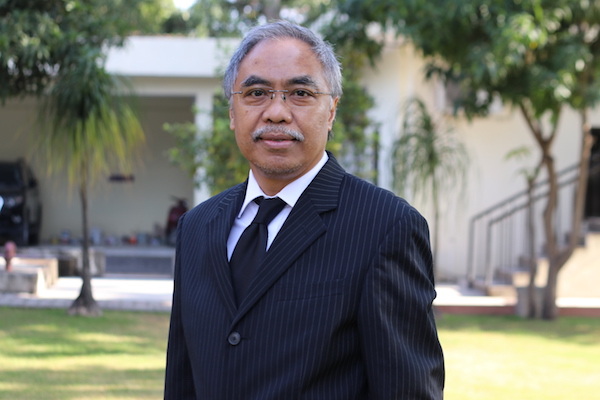
H.E. Adam M. Tugio: Thank you so very much. Bismillah-ir-Rahman-ir-Raheem. First of all, let me express my gratitude to you Co-Chairman, Mr. Khalid Mir for inviting me to join this session and discuss the relationship between Indonesia and Pakistan. If I may use PowerPoint to share some slides.
Indonesia and Pakistan’s relation has had a strong and solid foundation historically. We would be able to benefit from the commonalities between the two countries not only in terms of being the two biggest Muslim population countries, but also the fact that the strategy that is now being pursued by the Pakistani government actually corresponds with the strategy of Indonesia and also beyond Indonesia the ASEAN.
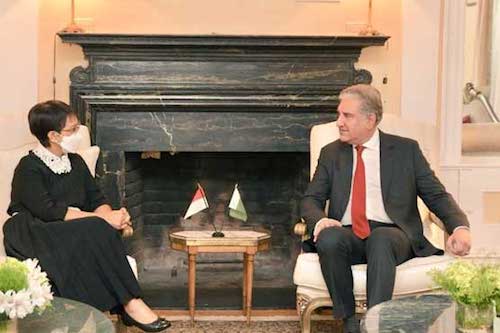
I learned, for instance, today that the government of Pakistan perceives the international relations with respect to geo-economy. The prime minister has put a lot of emphasis on projecting the importance of Pakistan as a hub to connect Central Asia, the western part of China and also South Asia. Likewise, Indonesia and ASEAN also put a lot of emphasis on creating a hub for expanding trade relations beyond Indonesia, beyond ASEAN when I say beyond ASEAN I refer to the RCEP the new arrangement being concluded between ASEAN and five dialogue partners Australia, New Zealand, Republic of Korea, China and Japan. So that’s the potential that I would like to highlight between Pakistan and Indonesia through the ASEAN.
In terms of the Indonesia Pakistan relations, Ambassador Sanaullah already mentioned the foundations are very strong. It goes beyond the historical foundations, but there are some limitations also, which is something that we also want to improve.
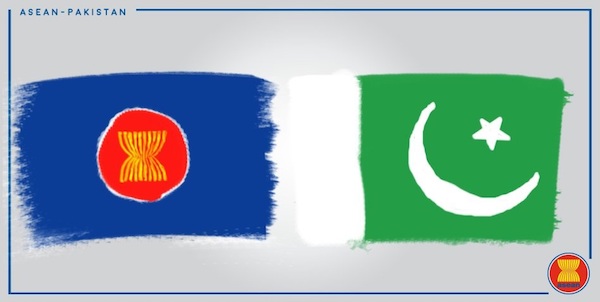
Nowadays, as Ambassador has mentioned, we enjoy a good relationship which actually encompasses a lot of aspects of bilateral relation on political, economic, and socio-cultural front. There is a strong foundation for the two countries to expand their relations on. The good news is that the mechanism for strengthening our bilateral relations already exists. The challenge is for us to think how to make more structural engagements at the highest level.
In politics, we have a lot of frameworks like political dialogue, bilateral consultations, but we need to have higher representation for instance, at the ministerial-level. That is why the two countries are now concluding the Joint-Ministerial Committee which hopefully will be kept by two foreign ministers. So that’s the idea of having more engagement at the highest level.
You see in this graphic how the trade doubled before and after the PTA. Even in the last year during the pandemic we see that trade between the two countries slightly increased around 8%.
Why ASEAN is important? If you look at it, there’s a lot of research to indicate that the future of economy lies in East Asia and I think in terms of population the market share of East Asia for the global economy is very high. You can see in the slide the importance of East Asia for the global economy.
Some of the consequences for instance, I have written in this slide. I think the interdependency is higher, by country to country, country to business, and business to business. I think this is something that we are very keen to work together with different stakeholders in Pakistan, including Karachi Council on Foreign Relations in raising awareness regarding and importance of Indonesia, and also the importance of ASEAN for bilateral relations with Pakistan.
I think in terms of trade, the numbers speak for themselves about the potential of Indonesia and ASEAN for Pakistan. Let’s work together. I’m looking forward to get input from you, to get suggestions on how the two countries could get the benefit of this expanding arrangement that we have in the region, and also using the foundations of bilateral relations between Indonesia and Pakistan. I will stop here, and certainly looking forward to have more discussions with you. Thank you so very much.
Commodore Sadeed Malik: It’s a brief comment. To me Indonesia is Sukarno, as is Quaid-e-Azam for us in Pakistan. To me, Indonesia is graves of Pakistani soldiers in Surabaya. To me, Indonesia is Nagarank Sank and Brahma-sutra the two Indonesian submarines that came to Pakistan in September 1965. To me Indonesia is, Komar-class missile boats in Chittagong that came to help Pakistan in September ’65. I feel these historic facts must get translated into the present with increase in trade and travel as pointed out by yourself Excellency and our ambassador Mian Sanaullah. Thank you, sir.
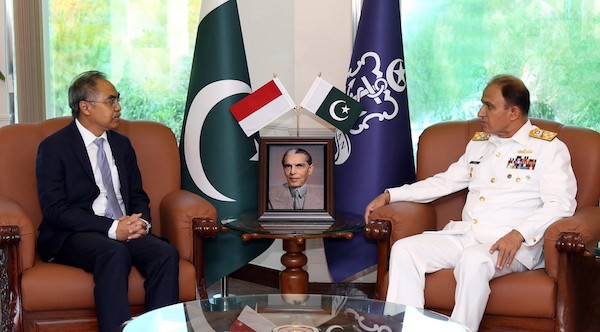
H.E. Adam M. Tugio: Well, thank you so very much Commodore Malik for your kind words for Indonesia. We are also indebted to the Pakistani soldiers who helped the Indonesian government during the early period of our independence. We are also taught in the history books that Pakistani soldiers helped Indonesia by making timely decisions and sending instructions. If I recall, in 1997 the Indonesian government invited the living Pakistani soldiers to Indonesia and they were awarded the highest accolades in Indonesia by the President. We were taught about that in history in schools.
Question & Answer Session
Q: Excellency it is a pleasure listening to you. What is your assessment about countries like Pakistan and Indonesia joining hands in the area of science and technology, which is now one of the areas where we should concentrate? Your suggestions, sir.
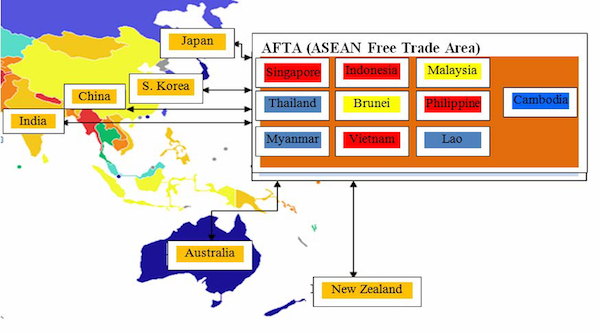
H.E. Adam M. Tugio: What you mentioned is right. The enthusiasm of President Habibi in developing the aviation industry in Indonesia it was his idea that paved the way for the establishment of one of the biggest aviation industries in Indonesia, which produces small aero planes, CN 234, which I guess Pakistan has also purchased four of them as part of the Pakistan Air Force. We are also working together with South Korea, in producing one of the fighter jets now jointly produced by Indonesia and South Korea in Korea with an agreement with the US. This is one of the areas where the two countries have the advantage of working together in defense sector.
Mr. Farooq Afzal: Worthy member from Saudi Arabia. Mr. Mohammad Siraj. Excellency his question is with regards to the promotion of bilateral tourism opportunities in both the countries, especially in Pakistan. Is there any possibility from Indonesia to invest in our Northern Areas, which can help us also to promote tourism in Pakistan?
H.E. Adam M. Tugio: I think the question placed by brother Muhammad Siraj is very important. I learnt that Indonesia and Pakistan are very blessed with abundant tourist destinations and Pakistan also has very scenic views. There are unique cultural traditions in Pakistan and also in Indonesia. So we are very blessed with that kind of heritage. Yesterday, if I may tell you frankly, we have also had consultations with tour operators in Indonesia. They explored possibilities to sell travel packages of Pakistani tourist destinations for the Indonesians visitors. It is already making waves in Indonesia how beautiful Pakistan is as a tourist destination. Pakistan has four seasons, unlike Indonesia with two seasons; tropical season. So they approached me and I have also certainly advised them to go to the Pakistani Embassy first in Indonesia because I believe it’s their job to promote tourism. I am more than happy to work together in promoting Pakistani tourism. During my communication with them now we are exploring possibilities of organizing a webinar with them together along with tour operators here in Pakistan.
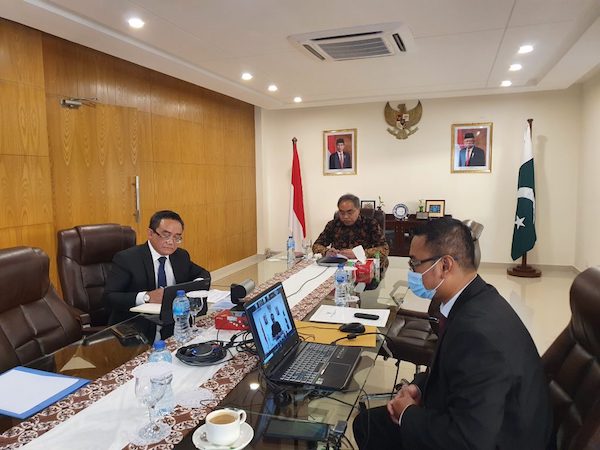
Mr. Farooq Afzal: I have two questions from one of the distinguished members, participant of today’s webinar, Salman Hassan. The first question is with regards to the recent situation in Afghanistan, where Pakistan is very keen to assist the growth and development of Afghanistan. So what role do you think Indonesia can play in the growth of Afghanistan? And secondly, this is with regards to the oil exhibitions here in Karachi, the former Ambassador Excellency Iwan Suyudhie Amri used to frequently visit edible oil conferences in Karachi and senior officials also came from Indonesia, so what is your plan to visit Karachi in this regard.
H.E. Adam M. Tugio: Good questions. Let me address the last question first. Due to COVID-19 we have had to limit our activities, that’s why, you know, I met several times virtually with the edible oil importers here in Pakistan. Even in the last two days, we met with one of the biggest importers of palm oil from Indonesia here in Islamabad, but we will certainly continue what has already been undertook by my predecessor who is a good friend of mine, Ambassador Iwan Amri to send people from Indonesia to attend Pakistani edible oil conference in Karachi. In fact, one of the first steps is that we are going to organize in Faisalabad, hopefully next month on this subject, a conference through webinar in collaboration with Faisalabad Chamber of Commerce and also with Faisalabad oil producers and importers. That is in the pipeline, and hopefully the health situation improves next year so we would be able to send more people from Indonesia to attend Pakistan’s edible oil conference.
Now on the first question the Afghanistan question, the Indonesian government first commended the role and contribution of Pakistan in facilitating the peace process. I think there is no country who made such tremendous efforts in facilitating the peace process in Afghanistan as Pakistan.
Mr. Farooq Afzal: I would like to ask the last question. This is with regards to the PTA, which was signed in 2013. It’s been eight years that PTA has been signed and we have not yet signed Free Trade Agreement. What do you say about this, how long it will take to sign FTA so that Pakistani exporters can also get access to the Indonesian market? I would like to have your comment on that.
H.E. Adam M. Tugio: This is something that we keep reminding our friends and stakeholders in Pakistan. Ambassador Sanaullah mentioned the importance of concrete implementation of the vision and policies. Deepening engagements need more structural engagements. I guess three things that need to be done. If you look at the way how we would be able to enhance bilateral cooperation, I am using a tripod analogy. When you look at a tripod, you have to have a solid foundation; in the political, economic and socio-cultural domains. The study of the FTA was concluded in 2003, actually, by the Pakistani government, even before we concluded the PTA. I think nowadays, with the RCEP concluded this year by the ASEAN will provide a huge opportunity for Pakistan. Pakistan needs to revisit not only the FTA but also possibilities of RCEP. If you look at the RCEP, there is a huge market and a huge population thirty percent of world population. Five RCEP countries Indonesia, China, Australia, Japan, South Korea are members of the G20. The total market revenue projection will be $481 billion by 2025. The compound annual growth rate is beyond five percent. The total GDP of 38.8 billion or 30 percent of global GDP. So I would like to encourage the Pakistani friends here to look beyond the FTA, ASEAN and Pakistan, because now with the RCEP it has yet to be entered into force but I think it is worth also contemplating to see beyond that.
Mr. Farooq Afzal: I would like to request our Co-Chairman Admiral Khalid Mir for his concluding remarks. Thank you very much Mr. Farooq Afzal.
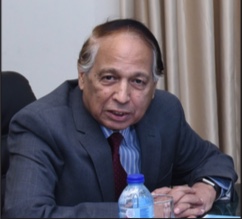
Admiral Khalid Mir: Excellency. It was such a wonderful experience to hear you today and a very fruitful one indeed. As you mentioned, our relationship on the historical aspect has advanced to more than 40 MoUs and agreements signed between our countries in the fields of economy, trade, defense, tourism, just about anything you can think of. Also, I believe we have a joint policy planning dialogue platform along with the framework for Pakistan-Indonesia security. Also we have a Joint Defense committee which I believe hasn’t met for some time. We could perhaps broaden the scope of these expressions by more regular meetings in the light especially of the new world order that seems to be coming into existence.
There are a lot of other points that you mentioned, which I can’t really read all of them right now, but the people-to-people contact is one of the most important things there is now in the shrinking size of the world. It should be given the emphasis that it requires, and the movements can only take place when they join in to move things on education, on health, on all these lines. I think the people-to-people contact is very important. I can go on for a long time to talk in the number of subjects that you have brought out but I’d like to thank you excellency for all that you said today and all the points that you have given for us to move forward. Our secretary is going to have a few hours writing down all that we have learned today and he’s going to send it to the ministry in furtherance of our aims and objectives together. So Excellency, thank you very much indeed. I am most grateful to you for having been with us today. I hope that in your next visit to Karachi will be honored by your visit to our Council as well. Thank you very much indeed again.
Mr. Farooq Afzal: Our chairman Mr. Ikram Sehgal has just landed in Lahore and he has joined the meeting. So I would also like to request him to say to say briefly something about the meeting and about the relations between Pakistan and Indonesia. Chairman Mr. Ikram Sehgal, please.
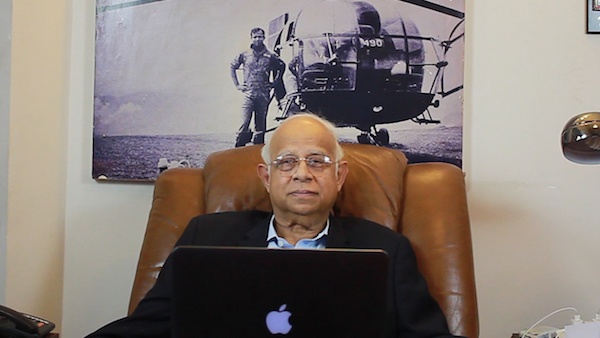
Chairman KCFR Mr. Ikram Sehgal: Thank you. Excellency, first of all, it’s a great honor in and I apologize because I was flying from Karachi to Lahore, I could not join earlier. But I listened to at least the last 30 minutes of it quietly and I am very glad that you could join us today. Let me tell you something which is common is that Commodore Malik is a Submariner from the Pakistan Navy. The first thing which Pakistanis always remember is during 1965 war, the four submarines that you sent to help us during the war. So we can never forget that tremendous gesture of friendship, and like our Co chairman has said, certainly, we would be honored and privileged whenever you come to Karachi that you give us time not only for the webinar, but also to give you along with the webinar a lunch or a dinner so that we can really talk with you, and through you with all the think tanks and the thinking people and businessmen in Karachi. Thank you very much, Excellency.


